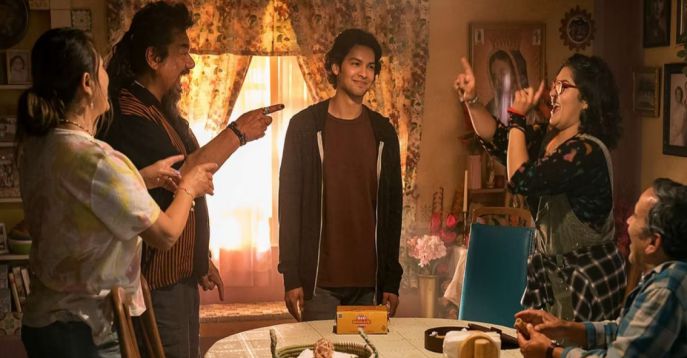Blue Beetle’s family-centric story has universal appeal, but the strength of the new DC movie lies in Jaime Reyes’ ties to his Mexican heritage.
Editor’s note: This piece was written during the 2023 WGA and SAG-AFTRA strikes. Without the labor of the writers and actors currently on strike, the movie being covered here wouldn’t exist.
Though it is not officially launching the DCU, Blue Beetle is a worthy introduction to the first new hero of the rebooted cinematic universe. Written by Gareth Dunnet-Alcocer and directed by Angel Manuel Soto, the movie’s task is simply to highlight Jaime Reyes as a protagonist everyone wants to root for — something which star Xolo Maridueña makes very easy. The actor brings a fresh-faced innocence to the already earnest script, and he is lifted up further by the various members of the Reyes family and their big personalities. But while Blue Beetle’s story has universal appeal regardless, the strength of DC’s newest entry lies in Jaime Reyes’ ties to his loving Mexican family.
Though Blue Beetle is based on DC comics, no knowledge of specific issues or even previous movies is required to step into the story. In fact, the only acknowledgment of the larger cinematic universe is the Superman and Batman namedrops that already appeared in trailers. This very much works in the movie’s favor, allowing audiences to focus on Jaime himself and the facts of life in Palmera City. From the moment he steps off the plane to return home after college graduation to the sounds of Calle 13’s “Atrévete-Te-Te”, it’s clear the movie knows exactly who he is and the culture he comes from. A clear-eyed optimist looking to improve his family’s station in life through intelligence and hard work, he is hit with a heavy dose of reality when he learns that his father lost his shop after a heart attack and his parents are about to lose their house.
The obvious route for Blue Beetle to take at this point would be for Jaime to come upon the Scarab and wield his newly-minted powers in selfish ways to fix his family’s misfortunes, but that would be antithetical to the young man he proves himself to be in the first few scenes. Instead, greatness is thrust upon him most unwillingly and his journey is one of understanding his new form and accepting Khaji-Da (voiced by Becky G) as part of himself. Helping him along that path are his parents Rocio and Alberto (Elpidia Carrillo and Damián Alcázar), his Nana (Adriana Barraza, who is herself an icon of Mexican cinema), Uncle Rudy (the always hysterical George Lopez), and his smart-aleck sister Milagros (Belissa Escobedo).
This close-knit family unit is the beating heart of Blue Beetle, and every moment they are all onscreen together feels like a warm hug. Dunnet-Alcocer’s screenplay is packed full of pop culture references only fellow Latin American viewers will understand, but the actors deliver them with perfect clarity and thus make the inside jokes accessible to all. Each Reyes brings a unique flavor to the household recipe, whether it be Rudy’s anti-government paranoia that was probably inherited from his ex-rebel mother or Alberto’s patient optimism that he clearly passed down to Jaime. There is a comfortable energy surrounding these domestic scenes, and they make up an arc that stands apart from the heroics and in some cases surpasses them.
Blue Beetle doesn’t lose its sense of fun when it dives into the titular superhero’s bag of tricks, and Maridueña’s performance is as perfectly suited to the sci-fi action scenes as it is to the more tender or comedic ones. Nevertheless, the movie does suffer from uneven visual effects which render the Scarab’s powers less impressive and make Kord Industries seem less imposing. The latter is the biggest obstacle keeping Blue Beetle from soaring high because they take up too much real estate as a villainous entity to be ineffectual. Susan Sarandon is clearly having a great time as evil matriarch and CEO Victoria Kord, but her war-mongering plan never feels like it amounts to a real threat — nor are her sidekicks Ignacio Carapax (Raoul Max Trujillo) and the so-called Dr. Sanchez (Harvey Guillén) given the focus they need to shine.
This is also where knowledge of DC Comics history comes in handy, as Victoria’s importance stems from her brother Ted Kord, who was the first Blue Beetle. While he doesn’t physically appear in the movie, his presence lingers through both his sister and his daughter Jenny (Bruna Marquezine), who becomes Jaime’s love interest. The ideological divide between aunt and niece when it comes to control of Korc Industries could make for an interesting political thriller of its own, but Blue Beetle is not particularly adept at diving into that area. Nor does it need to be, allowing the cold and distant state of the Kord family to contrast poignantly with the fierce love that the Reyes all have for one another.
Soto plays into the fact that the majority of the cast is Mexican or indigenous Latin American (or Brazilian, in Marquezine’s case) through more than music choices and telenovela shoutouts, but there was still a larger story about cultural clashes and class disparity left off the table. Perhaps the realities of day-to-day living in Palmera City, where families like the Reyes who are struggling to make ends meet coexist with tech billionaires like the Kords, could have been further explored if Blue Beetle didn’t devote so much time to trying to implement a world-ending threat. Despite that, the movie is a charming depiction of functional family bonds and one of the best introductions to a live-action DC superhero in recent memory.
Blue Beetle debuts in theaters on Friday, August 18. The film is 127 minutes long and rated PG-13 for sequences of action and violence, language, and some suggestive references.
READ: Puppy Love Review: A Decent Premise Is Thwarted By Bad Jokes & Little Romance
